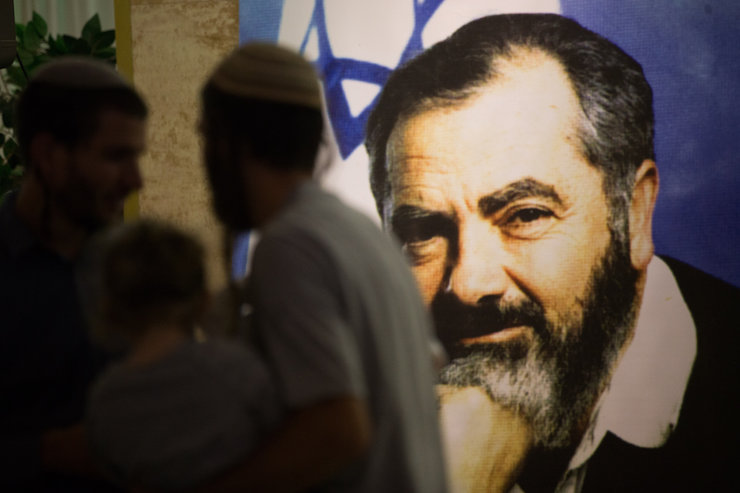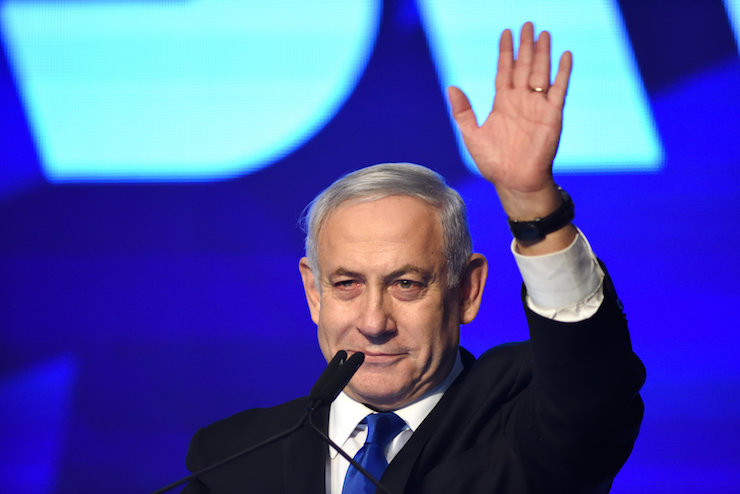While the Kahanist Otzma Yehudit party failed to pass the electoral threshold, the latest national elections in Israel saw the normalization of Kahane’s particular brand of overt racism.

Twenty-one years ago, Rabbi Meir Kahane stared into the camera during an election ad for his Kach party and told viewers, “[the Arabs of Israel] want to kill us, they want to wipe us out, and it is up to each and every Jew to rise up and say, ‘never again.’”
Last Wednesday, six days out from the most recent Israeli elections, Benjamin Netanyahu’s Facebook chatbot sent users a message warning them of the dangers of a “left-wing, secular, weak government that relies on Arabs who want to annihilate us all — women, children, and men.” That is why, the message said, voters needed to guarantee his place at the head of a right-wing, Jewish, “strong” government.
Although Netanyahu claimed that the message was created due to a staff error, it in fact made explicit the subtext to his central campaign tactic for these elections: incessant demonization of Palestinians, in the belief that stoking fear and hatred was the most likely route to victory.
Accordingly, over the past few weeks, the prime minister has assailed Palestinian citizens of Israel from every conceivable direction. He announced that Arabs were trying to “steal” the election; repeatedly issued ominous statements about a looming “left-Arab government;” and on Election Day itself, resuscitated his tactic of telling his supporters that the Arab turnout was at unprecedented levels.
This web of anti-Arab lies, incitement and paranoia wouldn’t have looked out of place on a Kach campaign flyer. Indeed, taken together, this messaging is simply a more elaborate version of another statement Kahane made in his 1988 election broadcast, while standing in Jerusalem’s Old City and lamenting that the city had become unlivable for Jews: “Look around: Arabs, Arabs, and more Arabs. What’s it going to be like in 10 years?”
Netanyahu is not, of course, a true Kahanist. For one thing, he has no interest in a Jewish theocracy, as much as he’s willing to advocate for those who do if it’ll keep him in power. Nor does he talk of “transferring” Palestinians out of the West Bank, although his embrace of annexation is a slippery slope. Netanyahu’s politics, rather, revolve around keeping himself and his family indefinitely ensconced in the prime minister’s residence on Balfour Street.
As Netanyahu’s grip on power has looked increasingly shaky in recent elections, however, he has leaned into Kahane’s brand of industrious, histrionic racism as a means of agitating his base. His traditional clutch move of invoking looming military threats from Gaza and the rest of the Middle East has now been overtaken by his conjuring up of a peril much closer to home — “the enemy within” — in order to maintain his reputation as “Mr. Security” and, with it, the keys to the Prime Minister’s Office.
It was not immediately clear in the wake of 2015’s “Arabs are going to the polls in droves” fiasco that this marked the start of a new electoral tactic for Netanyahu. Given how successful it was, the idea that this extravagant display of racism might prove a one-off was perhaps naive. Netanyahu did not pay a price for introducing a dose of Kahanism into his election-day messaging; on the contrary, it may well have saved him his job.
In April of this year, the prime minister went one better and personally intervened on behalf of the Otzma Yehudit party, populated by Kahane’s political progeny and faithful to his ideology. At the same time, Netanyahu consistently warned that a victory for the Blue and White party would bring Palestinians into the government. Once again, despite domestic and international uproar, Netanyahu did not pay a political price for his maneuvering or his message. Instead, he chalked up another electoral victory, albeit far less comfortably than in 2015.
In the most recent election cycle, incitement against Palestinians — alongside efforts to suppress the Palestinian vote through intimidation — was the central plank in Netanyahu’s campaign. And now, even as there is evidence that his racist ploy backfired by galvanizing Palestinian voters, Netanyahu is continuing to frame his premiership as one defined by its negation of Arabs.

In telling his meager crowd of supporters at the Likud post-election party that he had a “Jewish majority,” he effectively erased Palestinian voters from the democratic process. And in doubling down on his doomsday warnings about Palestinians entering the government if he is not prime minister, Netanyahu is distilling his message into a simple slogan: it’s me or the Arabs. Kahane would have approved.
As it happens, Kahane never made it into the Knesset in 1988. His Kach party was barred from running, officially because of its racist platform, but actually because his right-wing opponents feared he would eat into their support. This fact, along with the party’s outright ban not long after, is still heralded as evidence of the Israeli state being able to rein in dangerous levels of bigotry when they appear in its polity.
Yet the evidence does not support that assertion. Firstly, as Ron Cahlili recently wrote on this site, and as has been made so patently clear during the last few elections — not least by the prime minister himself — “hatred of Arabs as a political ideology is part of the mainstream political discourse.” And secondly, because Otzma Yehudit — a Kahanist party through-and-through — ran in both 2019 elections on a platform strikingly similar to the one that purportedly led to Kach’s outlawing.
Ah, but the counter-argument goes: the Israeli electorate thoroughly repudiated Otzma Yehudit this time round, giving them less than 2 percent of the vote share and thereby ensuring that they remain outside the Knesset. Like the response to the Kach ban, Otzma Yehudit’s showing at these elections is being offered as proof that Israelis rejected outlandish racism.
This conclusion overlooks the fact that Otzma Yehudit didn’t even need to run this time for Kahanist rhetoric and tactics to play a role in these elections. It’s easy to sideline, marginalize and mock fascists who are already in the shadow of vast political machines. The real test is when such sentiments come barreling out of the prime minister’s office. And on that front, the fact that Otzma Yehudit fell short is cold comfort indeed.

